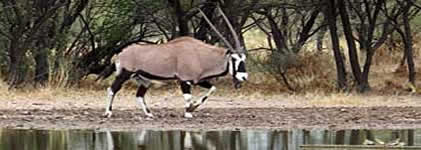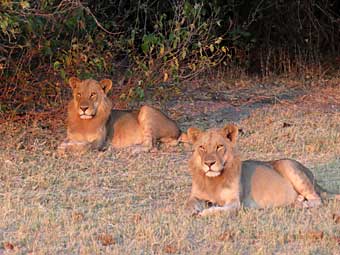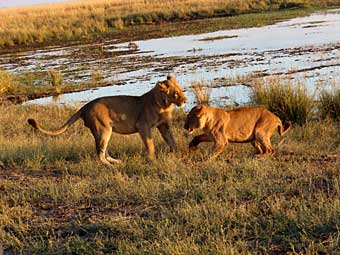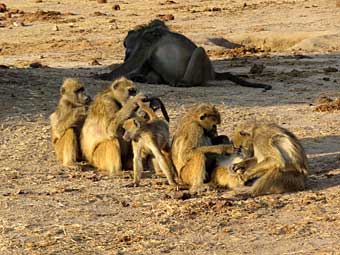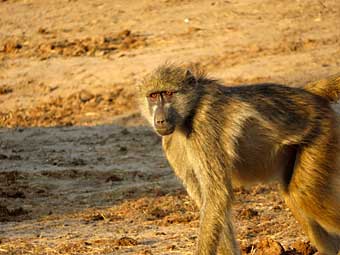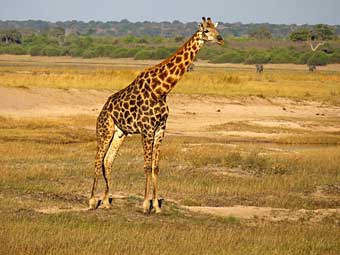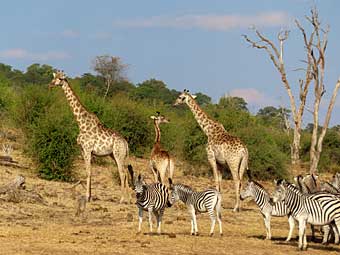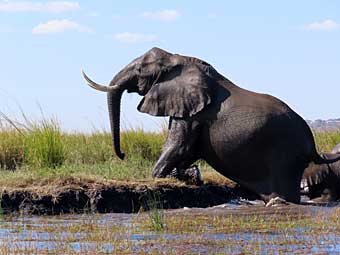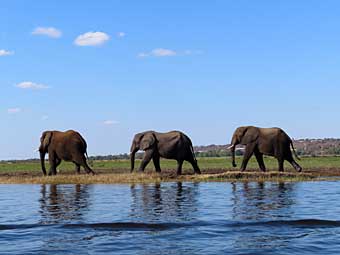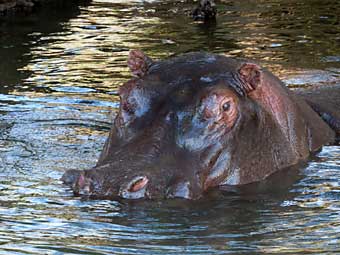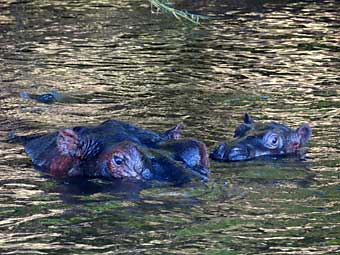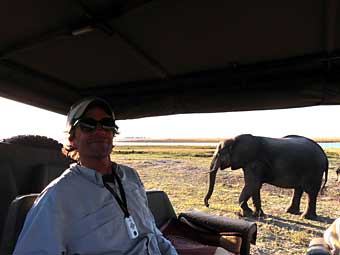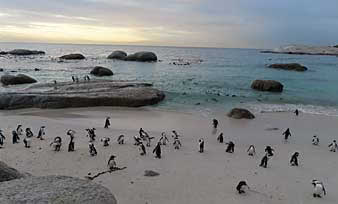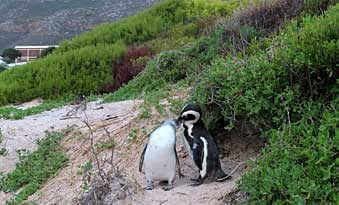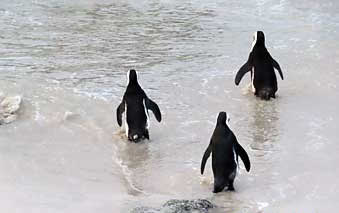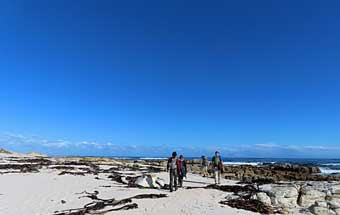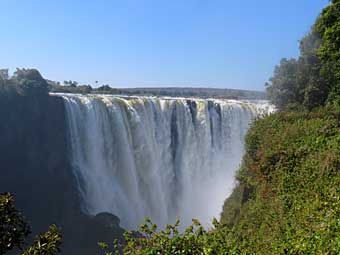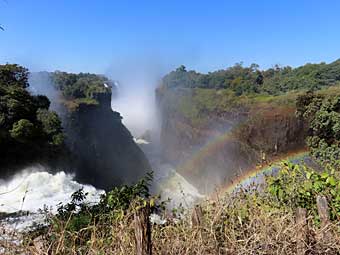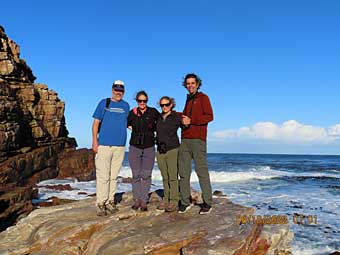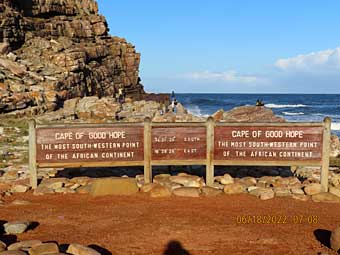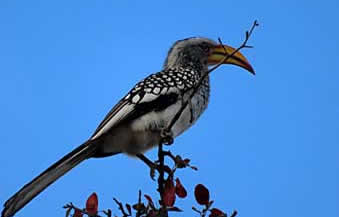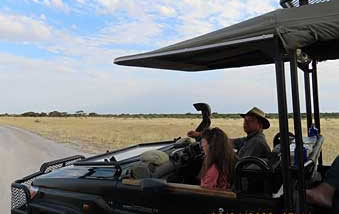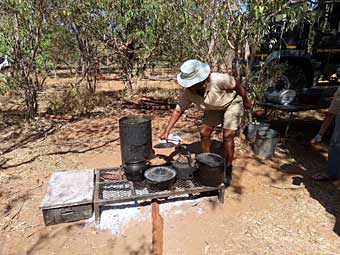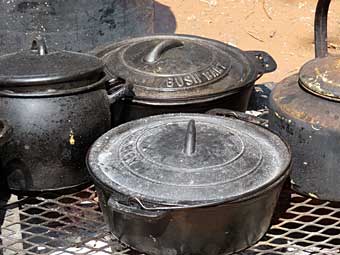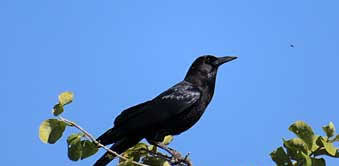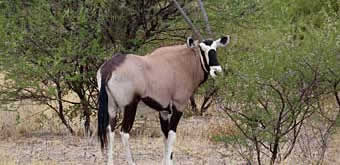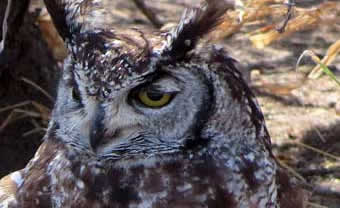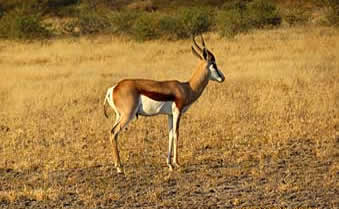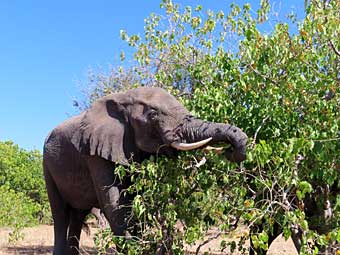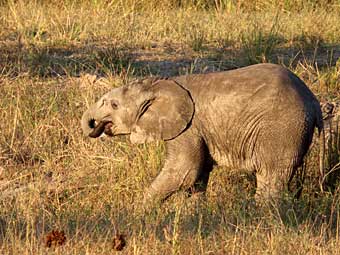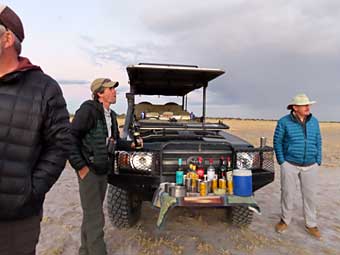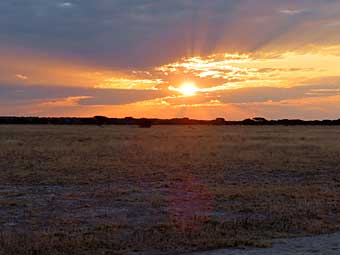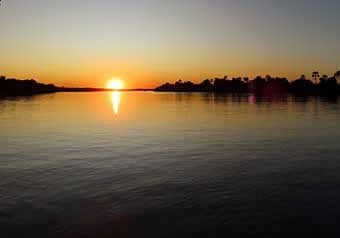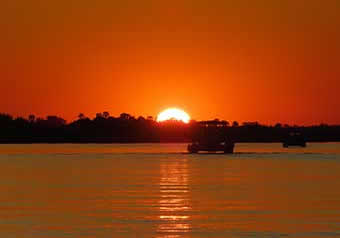| |
|
Chobe National Park, Botswana
| |
Llion brothers |
|
Llions playing |
|
Lions napped alongside their safari rigs, and during other more wakeful times, were busy mating.
The monkeys’ antics were fun to watch, but troublesome because they found ways to snitch camp food.
| |
Giraffe |
|
Giraffes and zebras |
|
Giraffes were so tall they towered skyscraper-tall.
| |
Elephant climbing out of the river |
|
Elephants walking the river bank |
|
And humongous elephants, were so bulky and heavy that giant trees shook as they thumped past along only a few feet away.
| |
Victoria Falls hippo... |
|
...and baby |
|
“So many animals,” Molly Juillerat says of her nearly two-week camping adventure in the wildlife-protected national parks of Botswana in South Africa. “It was like being in a National Geographic special every day.”
| |
Arriving in Chobe National Park |
|
Andy and elephant close by |
|
| |
Capetown penguins at the beach |
|
Penguins love |
|
| |
Penguins wade |
|
Walk on Capetown beach |
|
| |
Victoria Falls |
|
Victoria Falls with double rainbow |
|
Molly, my daughter, and her husband Andy Hamilton, traveled and camped in South African wildlife refuges for 13 days during their three-plus weeks visit last summer. The guided, mobile safari to remote areas of Botswana was eye-popping, but it was part of a longer visit that included taking an aerial cableway up Table Mountain, seeing penguins swimming at Boulder Beach, walking on beaches at the Cape of Good Hope, and lying sprawled out in the shallow waters above a cliff where Victoria Falls plunged steeply down.
| |
R to L, Andy, Molly, and friends |
|
Cape of Good Hope signage |
|
It was a trip that Molly, Andy, and friends had originally planned two years earlier, but was delayed by Covid-19 restrictions. Delayed, but worth the wait.
“We were immersed in seeing and living with animals,” Molly tells of the experience. “I knew it would be amazing, just being that close to animals and seeing them in their natural habitat.”
“Everybody should go there at least once and experience it,” insists Andy.
Africa’s iconic wildlife was the marquee highlight, but both say there was more, much more. Through Royale Wilderness, which specializes in small group tours and features guides well-versed in Botswana’s history, the group of eight that Molly and Andy were part of was educated on multiple fronts. They learned how Botswana became an independent country, the impact of diamonds on the country’s economy, the system of protected lands, and the region’s diverse plants and animals.
“The guides take pride in their country and history. You could tell it was a passion. It’s a job, but it’s also a lot more,” Molly said of the guides, including owner Johnny Ramsden and guide Moronga Kandodi in her kudos. “I feel like I learned a lot. They know a lot about the animals and plants, about the people, the land and the country.” With genuine admiration and appreciation, Molly said that the guides were “very good at paying attention to the interests of their guests and tailoring the trip towards what they wanted to see.”
| |
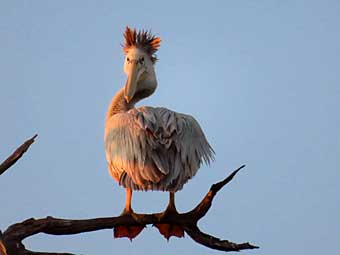 |
|
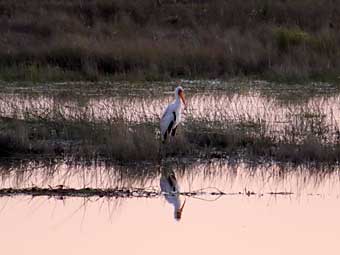 |
|
| |
Chobe National Park, pelican punk |
|
Chobe National Park, yellow-billed stork |
|
| |
Kalahari, yellow hornbill |
|
Capetown, King Protea |
|
Because the group included botanists, biologists and bird watchers, they were all introduced to more than 200 species of birds and enjoyed stops to study and identify plants.
| |
Kalahari, Johnny and Caren |
|
Our Safari rigs |
|
Their custom itinerary outing included nights in the Central Kalahari Game Reserve, Khwai Concession Area and Chobe National Park. The group of eight traveled in open-air safari vehicles, each with a guide, who do not carry guns.
| |
Chobe National Park, safari kitchen |
|
Safari cooking pots |
|
| |
Kalahari, cape crow |
|
Kalahari, gemsbok |
|
| |
Kalahari, spotted eagle owl |
|
Kalahari, springbok |
|
| |
Chobe National Park, elephant approaching |
|
Chobe National Park, baby elephant eating |
|
At camps, where they stayed two or three nights–“It was more like glamping than camping”–they were joined by chef Peggy Sue and other crew members. The routine included getting up before sunrise for porridge, coffee and tea before heading out. Along with the iconic animal species, some sightings included gemsbok, springbok, goshawks, foxes, zebras, steenbok, eagles and kudu. “In most areas you are not allowed to walk around outside of your camp. In Kway we were allowed to go for a walk with one of our guides. Johnny led us to a curious young elephant that walked close to 10 feet away from us, flaring its ears and reaching out with his trunk before backing up and moving away.”
| |
Kalahari, sundowner |
|
Kalahari, sunset |
|
About noon they returned to camp for “really amazing” meals prepared by camp cook Peggy Sue, who also served up riddles and songs. Then it was back out for afternoon game drives before returning to camp to relax, sip iced tea and munch snacks. Sunsets included dinners and, appropriately, “Sundowners,” end of the day drinks, as the sun went down. “The sunsets were amazing!”
| |
Victoria Falls Zambezi sunset |
|
Victoria Falls Zambezi boat sunset |
|
Park regulations require visitors to be at camp by dark, partly to help reduce poaching.
The many and varied sights included wild dogs that have no relation to domestic dogs. “That was probably one of the most amazing things, watching the puppies roll around, seeing the pups in their den.” The group watched as adult dogs that had had successful hunts and eaten their prey, returned to their dens and regurgitated their meals to feed the young.
“It’s amazing that this is left in the world,” says Andy, noting, “That’s where humans evolved.”
“I knew it would be amazing, just being that close to animals and seeing them in their natural habitat,” Molly says of the experience. “It’s not like going to a wildlife safari or zoo. I didn’t expect it to feel so genuine. Being there and seeing the wildlife and experiencing it was a lot different than I thought it would be.”
TO LEARN MORE
For information about Royale Wilderness visit their website at www.royalewilderness.com or visit their Facebook page at www.facebook.com/royalewilderness. The company is based in Maun, Botswana.
About the Author
| |
Lee Juillerat is a semi-retired writer-photographer who lives in Southern Oregon. He is a frequent contributor to several magazines, including “Southern Oregon Magazine,” “The AG Mag,” “Range,” and “The Cattle Mag.” He has written and co-authored books about various topics and places, including Crater Lake National Park and Lava Beds National Monument, and, most recently, “Ranchers and Ranching: Cowboy Country Yesterday and Today.” Lee has produced photo-stories for High On Adventure for more than 20 years. He can be contacted at [email protected]. |
|
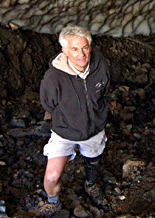 |
|
| |
|
|
|
|
|
|
|
